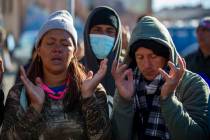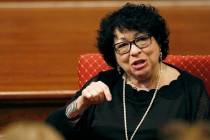Join the fight against sex trafficking
The crime of sex trafficking is one of the most egregious human rights violations, and it is happening in Nevada.
Its victims are lured into this country with false promises of legitimate work, only to be forced into the sex industry on arrival. They are domestic runaways taken in by traffickers and forced to trade sex for a place to sleep. They are girls baited into "the life" by a presumed boyfriend who later reveals himself as a pimp. Much like a victim of domestic violence, sex trafficking victims are trapped by fear, isolation and brutality at the hands of their traffickers and those who purchase them for sex.
In a recent Las Vegas case, a victim was beaten and then burned over and over again with a hot iron by her pimp. In a separate Las Vegas case, a victim was viciously pulled by her hair and dragged out of a good Samaritan's car by a pimp while trying to escape. The pimp stood in front of the car with a boulder in his hands to prevent the good Samaritan from leaving.
Sex trafficking affects every city in our state. Pimps from Sacramento, Calif., recently led a concerted effort to move operations to Reno.
Sex trafficking is a category of human trafficking, which is the selling of human beings for profit through forced labor, sexual exploitation or involuntary domestic servitude. Experts estimate 27 million people are trafficked worldwide annually, reaping $32 billion in illegal profits, which makes it the second-largest and fastest-growing black market in the world. Within the United States alone, it is estimated that nearly 300,000 children are trafficked for sex every year.
Sex trafficking is a crime that can be difficult to identify and track. The Internet and websites such as Backpage.com have only exacerbated this problem by taking the sex trade off our streets and into hotel rooms - out of the sight of law enforcement and social services. Our computers provide access to a variety of sites that promote prostitution, which make millions of dollars by offering anonymity to traffickers, further facilitating the victimization of children.
The Trafficking Victims Protection Act, passed in 2000, was the first federal law to emphasize the need to protect victims and offer legal protection for victims of trafficking. States have responded by passing comprehensive human trafficking statutes and updating existing statutes.
Nevada is also taking action. Recently, I held a summit in Las Vegas that brought together legislators, law enforcement, judges, treatment providers, faith-based leaders, attorneys, victims and advocates to address the issue of sex trafficking in Nevada. During the 2013 legislative session, I am introducing Assembly Bill 67 to protect our victims and combat sex trafficking,
While momentum against trafficking is increasing, more must be done. Just as domestic violence all too recently was a topic broached only behind closed doors, bringing the tragedy of sex trafficking into the public eye is the first step in its prevention. Those who receive messages from popular music, movies and television that selling sex is just another career choice should know that most prostitutes are, at the very best, selling themselves for the lack of other means to support themselves.
Many aren't willing participants. And the stark reality is that many aren't even old enough to consent to sex. Nationally, the average age of girls forced into the sex trade is between 12 and 14. The youngest known victim in Nevada was 12 years old. Once apprehended, johns increasingly face serious criminal prosecution. These basic facts, if widely understood, should reduce the number of sex trafficking victims.
Join the fight. Consider offering your time and financial support to organizations that provide services to victims. Men can speak out against johns who purchase minors for sex. Parents, parent-teacher organizations and schools can help educate children about how to protect themselves online. Doctors, nurses and hospitality and travel industry workers can seek training to identify victims and help them access services.
Each one of us can do something to combat sex trafficking.
Catherine Cortez Masto is the Nevada attorney general.























